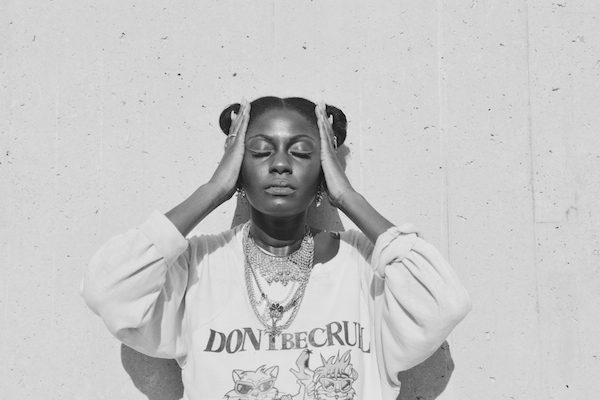
Among humanity’s more limiting foibles is our perpetual need to categorize, to label, to place things into boxes. I assume this is some leftover remnant of our evolutionary selves, the need to discern who or what is a threat in order to survive. This persistent obsession with labels survives today, less out of the need to survive as the need to organize huge chunks of information and the mass of self-publicized avatars filling our social media feeds. And so we box one another in, from aspects as inherent as the colors of our skin to traits as superfluous as the music we claim to listen to on Instagram. To whose detriment? Those who aspire to evade definition and exist outside the realms of our biases.
One such person is Enongo Lumumba-Kasongo, who raps under the alias Sammus, a name she took from the video game Metroid. Sammus is a woman inhabiting several boxes at once. The Philly-based MC learned early how to balance different aspects of her personality as a child born and raised in upstate New York by two professor parents. Her issues with identity growing up as a black girl in a predominantly white area, the need to stay true to her creative practice while meeting the lofty academic expectations of her parents are all struggles she has rapped about before. These lessons served her well as she continues to write rhymes that flawlessly “converge at the intersection of race, womanhood, sexuality, and nerdiness,” seamlessly intertwining these different aspects of herself into an insightful and idiosyncratic whole.
So too did it prepare her for her impressive academic pursuits in the Science & Technology Studies department at Cornell University, where she is working towards a PhD in Sound Studies. Her appreciation for nuance, well-documented in her raps, shines through as she explains what this means to me, laughing as though she’s doing a poor job explaining while actually doing so almost poetically: “a sociological or anthropological or historical approach to thinking about science and technology, so basically all the things that get shaved off when we think about science and technology, all the people, all the human parts and elements of how these things come to be.”
These human parts, namely her appreciation for video games, cartoons, and Internet culture, play a massive role in Sammus’ musical creations as she evades expectations and sets whole new ones. Her sound, particularly after touring with Mega Ran and the release of concept album Another M, has often been described as “nerdcore,” a subset of rap dominated by white men appropriating tenets of traditional hip hop to produce tracks about gamer culture. Gamer culture itself is doused in white masculinity, leaving little room for women at all, let alone black women. Sammus’ music directly challenges this, as if to say, “Who says black girls can’t be nerds too?” in verse far more poetic and biting.
While she blows the lid off our pre-existing notions of “video game nerd” or “nerdcore rapper,” her invasion of this space has not been without challenges. She describes “a loneliness or a desire or a wish that these places were more receptive to bringing in more women like me…the challenge there, is trying to break down an idea that isn’t just in nerd or geek space, but I think pervades the music industry in general which is, especially for black women: “there can only be one”. I think we’re watching this happen as a result of Nicki Minaj and Cardi B, people saying that it’s this or it’s that, either this artist can be big or that artist can be big. There’s no room in this hemisphere for there to be more than one, for there to be these two artists at the same time and that there’s more than those artists.”
She laments too that people often challenge her expertise as a result of her identity in these male-dominated spaces. Like many female musicians, she recalls instances where venue staff assumed her male partner was the performer on tour, or that she doesn’t create her own beats. Pervasive too are the assumptions about her knowledge of gamer culture, assumptions that are familiar for any female person who has dared to challenge a man on any pop culture subject. Who among us hasn’t been asked something along the lines of “Do you actually like this band or did your boyfriend tell you about it?” She acknowledges these assumptions coming at her from the outside world but also from within, the way other people’s assumptions about you can color your perception of yourself: “I took my name Sammus from a video game character — she’s one of the first if not the first playable women characters, and what I really love about her story is that in the game you can’t tell what she looks like and she has this suit of armor on, but then when the armor comes off you learn she’s a woman, at the end of the game, and then you know the credits come. And I remember as a kid being like whoa! That was like a total plot twist! Because it made me question my own gendered assumptions about things.” While in a perfect world we wouldn’t direct other people’s prejudices inward and have these sorts of assumptions, this story is ultimately inspiring. Just as Samus of Metroid inspired the young Enongo, perhaps she has or will inspire other brown and black girls that there is room for them in nerd culture too.
All that being said though, these labels and assumptions, both internal and external, don’t merely regard identity but craft it as well. The unsolicited “nerdcore” label was challenging not only by virtue of being a black woman in a white male space, but also because of the possible limitations it presented for Sammus’ artistry. “I recognize that folks need ways to understand what it is you’re doing, so my music talking a lot about video games or cartoons and things, and really leaning on those references, for some folks this felt like a natural home for what I was doing,” she explains, “So the way that I’ve learned to manage or work with the term nerdcore is to say that I have a nerdcore project, an album that is nerdcore, but I don’t consider myself a nerdcore artist.”
She has, however, embraced the label “afrofuturist,” as an intentional effort to reclaim her own self-definition. Afrofuturism as an artistic movement focuses on the intersection of blackness and technology, utilizing tropes and elements of science fiction to reexamine events of the past or imagine a future stemming from black experiences. Lauding artists like pioneer Sun Ra and contemporary artist Moor Mother, she says “I actually started using the term afrofuturism as a way to counteract nerdcore, thinking that folks are going to want to categorize me no matter what I do, at least I can kind of get ahead of that and use a term that I feel like makes sense for me.”
While she acquiesces to this part of human nature, it doesn’t mean she considers her self-definition concrete or finalized ever, always trying to challenge herself to create new and different music. This is where the seed was sown for her upcoming September residency at Mercury Lounge on the Lower East Side, four weeks of shows with lineups that explore different aspects of black musical artistry and different “sonic interests” of Sammus. Week one showcases what she describes as “weird hip hop,” featuring the likes of emerging MC Deem Spencer, while week two delves into the world of “black folk” with Mal Devisa. Week three will feature glitchier, noise artists like Machinegirl, wrapping it up with more rock-oriented acts like Jelani Sei in week four. Sammus promises ample new music from herself as well, saying “What I want to do is challenge myself to perform different things on different nights. I’m hoping to explore my catalog to perform things I’ve never performed before, and actually yesterday I started working on a song that I’m loving so much that I’m going to try to force myself to memorize it to perform at the residency. So yeah! Trying out new stuff that I’m putting on the next project, that’s the goal of this.”
And working on the new project she is, saying that it will be a more “chill” album than her last, 2016’s introspective and honest Pieces in Space. This makes sense in a way, a chill headspace that perhaps originated in this perfectly Sammus-shaped niche she has carved for herself in the hip hop world. It’s a space between self-definition and external assumption, the knowledge of who you are and the acceptance that others will label you anyway. Yes, indeed, they’ll label you, but they won’t define you without your permission.




